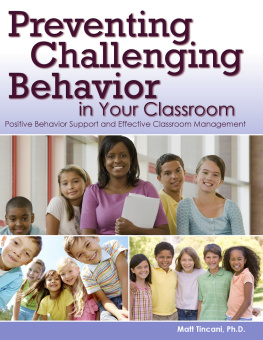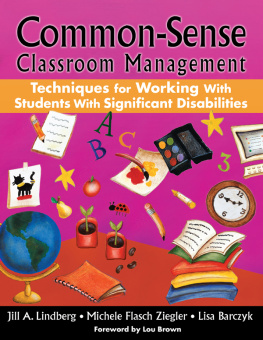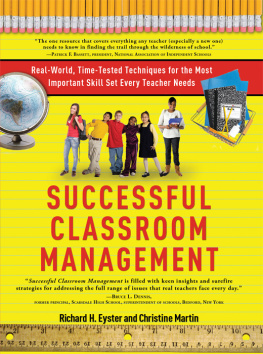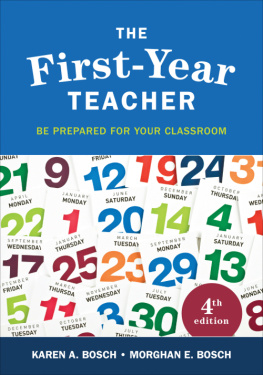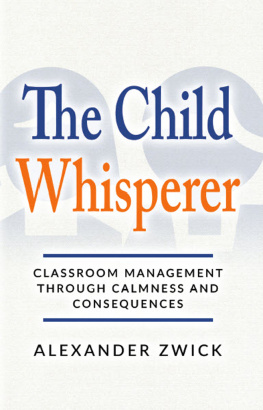Laverne Warner - Preschool Classroom Management: 150 Teacher-Tested Techniques
Here you can read online Laverne Warner - Preschool Classroom Management: 150 Teacher-Tested Techniques full text of the book (entire story) in english for free. Download pdf and epub, get meaning, cover and reviews about this ebook. year: 2004, publisher: Gryphon House Inc., genre: Children. Description of the work, (preface) as well as reviews are available. Best literature library LitArk.com created for fans of good reading and offers a wide selection of genres:
Romance novel
Science fiction
Adventure
Detective
Science
History
Home and family
Prose
Art
Politics
Computer
Non-fiction
Religion
Business
Children
Humor
Choose a favorite category and find really read worthwhile books. Enjoy immersion in the world of imagination, feel the emotions of the characters or learn something new for yourself, make an fascinating discovery.

- Book:Preschool Classroom Management: 150 Teacher-Tested Techniques
- Author:
- Publisher:Gryphon House Inc.
- Genre:
- Year:2004
- Rating:5 / 5
- Favourites:Add to favourites
- Your mark:
- 100
- 1
- 2
- 3
- 4
- 5
Preschool Classroom Management: 150 Teacher-Tested Techniques: summary, description and annotation
We offer to read an annotation, description, summary or preface (depends on what the author of the book "Preschool Classroom Management: 150 Teacher-Tested Techniques" wrote himself). If you haven't found the necessary information about the book — write in the comments, we will try to find it.
An essential resource that all teachers will appreciate! Written by two experienced teachers, Preschool Classroom Management offers solutions and suggestions to help you tackle behavior issues in the classroom. Chapters include working with challenging behaviors, teaching alternative behaviors, building a caring community in the classroom, teacher tips and techniques, and dealing with daily routines and schedules.
Laverne Warner: author's other books
Who wrote Preschool Classroom Management: 150 Teacher-Tested Techniques? Find out the surname, the name of the author of the book and a list of all author's works by series.
Preschool Classroom Management: 150 Teacher-Tested Techniques — read online for free the complete book (whole text) full work
Below is the text of the book, divided by pages. System saving the place of the last page read, allows you to conveniently read the book "Preschool Classroom Management: 150 Teacher-Tested Techniques" online for free, without having to search again every time where you left off. Put a bookmark, and you can go to the page where you finished reading at any time.
Font size:
Interval:
Bookmark:


Contents
Preschool Classroom Management
By Laverne Warner and Sharon Anne Lynch
Other books by Laverne Warner:
Fun With Familiar Tunes
Language in Centers: Kids Communicating
Themes Escapades: Learning Units for All Occasions
Tunes for Tots
What If Themes: Making the Most of Teachable Moments
Cop yrig ht
2004 Laverne Warner and Sharon Lynch
Printed in the United States of America.
Published by Gryphon House, Inc.
PO Box 10, Lewisville, NC 27023
800.638.0928 (toll free); 877.638.7576 (fax)
Visit us on the web at www.gryphonhouse.com
All rights reserved. Unless noted otherwise, no part of this publication may be reproduced, stored in a retrieval system or transmitted in any form or by any means, electronic, mechanical, photocopying, recording or otherwise, without the prior written permission of the publisher.
Cover photgraph: Veer Inc.
Illustrations: Nancy Alexander and Janet Brown McCracken
Reprinted December 2011
Library of Congress Cataloging-in-Publication Data
Warner, Laverne, 1941
Preschool classroom management : 150 teacher-tested techniques / by Laverne Warner and Sharon Lynch.
p. cm.
Includes bibliographical references and index.
ISBN 978-0-87659-291-5
1. Classroom management. 2. Preschool education. I. Lynch, Sharon,
1949- II. Title.
LB3013.L96 2004
372.11024--dc22
2004002096
Bulk purchase
Gryphon House books are available for special premiums and sales promotions as well as for fund-raising use. Special editions or book excerpts also can be created to specification. For details, contact the Director of Marketing at Gryphon House.
Disclaimer
Gryphon House, Inc. and the authors cannot be held responsible for damage, mishap, or injury incurred during the use of or because of activities in this book. Appropriate and reasonable caution and adult supervision of children involved in activities and corresponding to the age and capability of each child involved, is recommended at all times. Do not leave children unattended at any time. Observe safety and caution at all times. Every effort has been made to locate copyright and permission information.
Introduction
Mrs. Black overheard four-year-old T. J. say to Jeremy, What would happen if I pulled that handle? She heard Jeremys reply, too, I dont think youre supposed to do that, and she turned around in time to see T. J. pull the fire alarm in the foyer of their building that led to the playground. Within minutes the center was evacuated, and within hours Mrs. Blacks director had ordered a protective cover installed over the alarm to prevent a similar event from happening again in their school.
Preschool Classroom Management: 150 Teacher-Tested Techniques is designed to assist teachers who are new to the field of early education or who have years of experience. It provides both a classroom management framework and solutions and suggestions of what to do when specific situations arise. Just like the protective cover placed over the fire alarm in the above anecdote, classroom management techniques described in this book aim to prevent problems before they happen or to provide solutions when they do.
Classroom management is a key component in helping children develop into independent individuals who can control their emotions, make positive decisions about their activities, and learn effectively. Classroom management provides a foundation for children as they learn socially appropriate behaviors. It is a process that requires interactions among teachers, parents, and children to help children understand their own feelings and the feelings of others. Positive interactions and relationships between children and adults are critical to childrens successful learning.
The techniques described in this book are based on three beliefs:
1. Adults must model self-regulated behavior in their relationships with children.
2. Teachers need to be sensitive to childrens needs.
3.Children want to know how to behave and to do what is expected of them.
Understanding these beliefs is important to the goals for childrens development and learning. Teaching socially appropriate behavior is the most important component in classroom management.
How does this happen? Initially, you need to have realistic expectations about the children you are assigned to teach. Young children are generally impulsive, and emotional outbursts are typical during their waking hours. They cry, push, shove, yell, want toys others have, and they live in the moment. As Joanne Hendrick (2003) writes, childrens wants are immediate, intense, and personal (p. 249). Daily interactions with young children require you to be responsive to childrens needs and approach classroom management with calmness and consistency.
Children need adults who are concerned about them and who understand that the problems they are encountering are real. You must be willing to help children find solutions to their problems. Defining the problem and suggesting solutions that are workable will help children learn that lifes problems, no matter how insurmountable they seem, can be discussed and eventually resolved.
Secondly, you need to help children clarify the rules and limits they want to set within their classroom. Five-year-olds are capable of helping to develop class rules, but younger children will most likely need the rules outlined for them. Three or four simple rules that cover a number of management areas are better than numerous, quite explicit statements. Children can learn to:
1)be a friend in the classroom
2) remember to take turns
3) think about safety
Taking time at the beginning of the school year to define the rules, and reminding children of the rules on a regular basis fall under the classroom management umbrella. For example, Wilsons attempt to knock down Vergies block structure could prompt the teacher to step in, remind Wilson that he needs to be a friend to Vergie, and talk with him about other activities he could do while waiting for Vergie to finish playing in the block center. Teachers use this strategy, known as redirecting behavior to maintain happy, productive classroom environments. The ability to utilize redirection effectively requires that teachers talk to children about their actions and help them understand the consequences of their behaviors.
Look at Vergie, you might say. She is upset that you knocked down her block structure. Wilson, lets help her pick up the blocks. Then Ill help you find something else to do for a while. Vergie will be through playing with the blocks later on, and then you can build your own block structure.
Sometimes you can help children by allowing them to work out their own problems. Attune your ears to what is happening, listening to hear whether children may be demonstrating that they are learning to assert their own needs without having to step in. For example, a loud yell from a child in the housekeeping center does not necessarily mean that immediate intervention is necessary. What you might hear, if you pause and listen, is this:
Hey, Junie, you took my doll! yells Marcy. I wasnt through playing with it yet.
I wanted to play with her today, asserts Junie.
You can play with her in a minute. I wanted to feed her, but you can have her after that.
Okay, Junie replies. Ill be back to play with her when you finish feeding her.
The chapters in this book address a range of classroom management issues. Chapter 1 summarizes the behaviors effective teachers demonstrate when guiding young children, including how teachers can care for themselves and balance their own lives to work efficiently with children. Chapter 2 defines general classroom management principles that work in any classroom. The impact of environmental design and how it affects childrens learning are addressed in Chapter 3 of this book. Planning effective daily routines and schedules is the topic of Chapter 4, developing a caring community of learners is the main theme of Chapter 5, and creating supportive parent partnerships is discussed in Chapter 6. Chapter 7 outlines analyzing problem behaviors, and Chapters 8 and 9 cover teaching alternative behaviors and communication skills. Classroom management, which is an ongoing process, is not always easy. Children need consistency. Lots of patience and numerous interactions with children and their parents are essential ingredients of effective classroom management.
Font size:
Interval:
Bookmark:
Similar books «Preschool Classroom Management: 150 Teacher-Tested Techniques»
Look at similar books to Preschool Classroom Management: 150 Teacher-Tested Techniques. We have selected literature similar in name and meaning in the hope of providing readers with more options to find new, interesting, not yet read works.
Discussion, reviews of the book Preschool Classroom Management: 150 Teacher-Tested Techniques and just readers' own opinions. Leave your comments, write what you think about the work, its meaning or the main characters. Specify what exactly you liked and what you didn't like, and why you think so.


